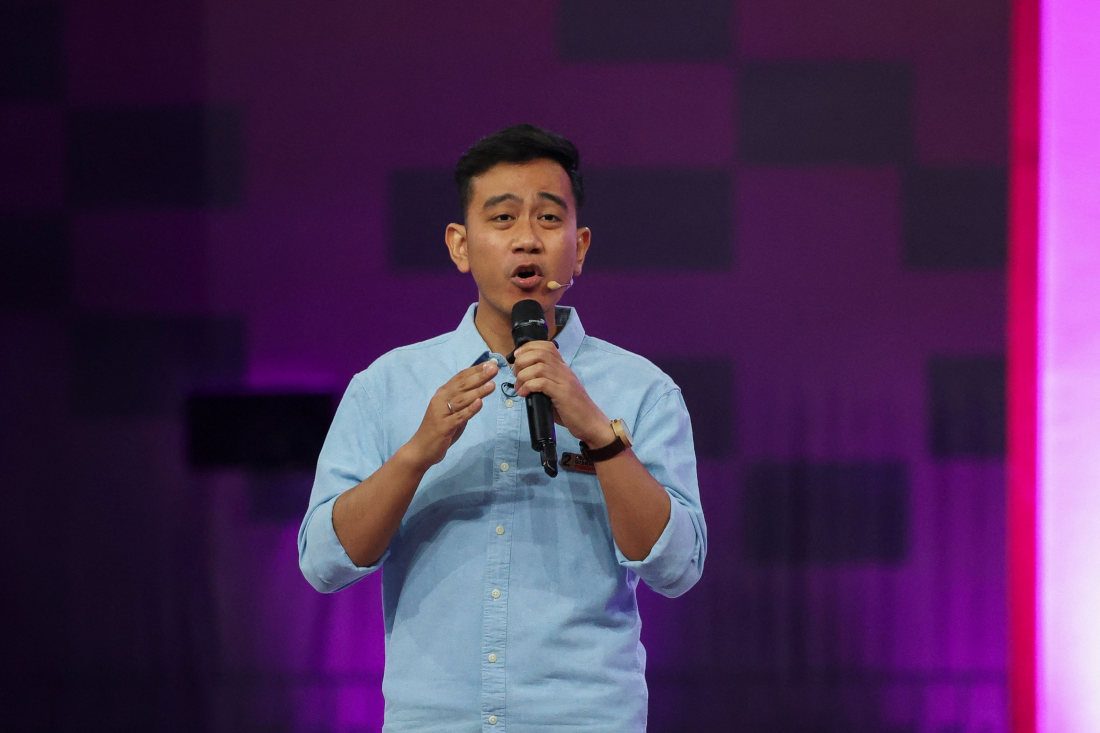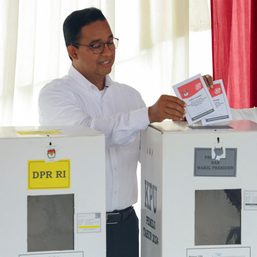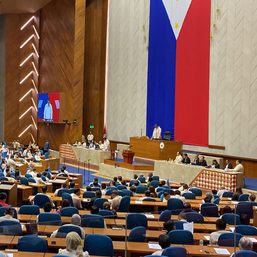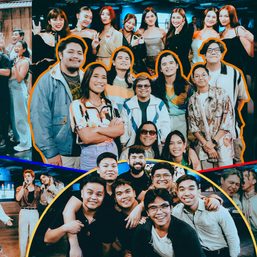SUMMARY
This is AI generated summarization, which may have errors. For context, always refer to the full article.

JAKARTA – Gibran Rakabuming Raka never relished the spotlight. This became evident after his father held his first press conference as Indonesia’s 7th president in 2014, when he introduced his family at the National Palace. Wearing a simple brown batik, the eldest of three children only made a brief statement when questioned about his limited appearances during his father’s campaign.
“If I were unemployed, maybe I would accompany my father everywhere. But I’m busy working,” said Gibran, then 28 years old. Gibran didn’t answer any other questions from the media that day.
Fast forward to 2023, and Gibran’s short and vague responses are now his signature trait as a politician. The 36-year-old son of President Joko Widodo has become the youngest vice presidential candidate in Indonesian history. Gibran is able to run for the top post after Indonesia’s court, then headed by his uncle, lifted the ban on politicians under 40 from seeking elective national positions. The court granted an exception that favored Gibran, mayor of Solo: that candidates under 40 can run for national posts provided they have served in legislative councils or regional heads.
Today, Gibran, despite a vague vision, is seen as a frontrunner to become vice president of the third-largest democratic nation in the world, boasting a population of over 270 million. The election will be held in February 2024.
Choosing food over politics
Father and son share the same aversion to bombastic speeches.
President Widodo, popularly known as Jokowi, is viewed as a quiet, results-oriented policymaker. When he was first elected, Jokowi was lauded for bringing in change to Indonesia’s brand of politics, having been the first president without a military or political elite background. Jokowi grew up in a riverside slum, and was seen as a no-nonsense politician and a true democratic symbol for the country with the world’s largest Muslim population.
But compared to his father, Gibran is described by journalists as even quieter. Throughout his journey from being the president’s son to assuming the role of Solo mayor in 2021, Gibran seldom engaged in sit-down interviews. Instead, journalists had to rely on brief ambush opportunities to get an inkling of his thoughts – with the only opportunity often arising when he’s on his way to office.
Rappler requested an interview with Gibran for this piece but did not hear back.
According to local journalist Tina Dewi, who closely followed Gibran’s mayoral activities for almost two years, Gibran’s interactions with the press diminished even further after assuming the role of vice-presidential candidate. “As long as I remember, [Gibran] has not been a talkative politician,” Tina told Rappler. “He became increasingly less talkative with the press after becoming a vice presidential candidate.”
Before becoming a prominent figure in Indonesia’s 2024 general election and the symbol of Jokowi’s political ambitions to build his own dynasty, Gibran on several occasions expressed disinterest in following in his father’s political footsteps. He sought to distance himself from Jokowi’s shadow by not continuing the family’s furniture business, choosing instead to venture into the culinary industry and securing capital through bank loans.
In a rare interview with Rappler in 2016, two years after his father first became president, the then-28-year-old entrepreneur agreed only to talk about his food business, pointing out that he was not interested in politics. Back then, he described his relationship with Jokowi as “very close,” but said their conversations were devoid of politics and they spoke “mostly on family matters.”
“I cannot even force him to take over one of my furniture factories, let alone force [him to] become a politician,” Jokowi said of his son in 2018, when asked about Gibran’s chances of getting involved in politics. At the time, widespread speculations, fueled by Jokowi’s supporters, suggested that Gibran was being groomed to continue the family’s political legacy as the mayor of Solo, hometown of Jokowi that’s officially known as Surakarta.
That same year, Gibran again emphasized his disinterest in politics. He even expressed concerns about the potential negative impact of a Jokowi political dynasty on Indonesia’s democracy. “I study management, not politics. [Being a politician] is definitely not my field of expertise,” said Gibran, as quoted by Kumparan on March 18, 2018. “Building a political dynasty will not serve people’s interest.”
But politics prevailed in the end.

Surprise move – and Prabowo
It all started in September 2019, when Gibran registered as a cadre for the Surakarta branch of the Indonesian Democratic Party of Struggle (PDIP), shocking political pundits. This sudden decision secured him a candidacy in 2020 for mayor of Solo, the city that jump-started his father’s political career, just days before the deadline for candidate registration. His move was fully backed by Jokowi who personally lobbied PDIP Chairman, Megawati Soekarnoputri, to give her blessing. At that time, PDIP already had its own candidate for the mayoral race, who ultimately stepped aside to make way for Gibran.
Gibran won the election in a landslide.
Many sources, including members of Gibran’s internal campaign team contacted by Rappler, couldn’t pinpoint the exact moment when he started warming up to politics. These days, however, it’s beginning to show how he’s been defying expectations.
For example, Gibran abandoned the PDIP party and withdrew support from the party’s presidential candidate, Ganjar Pranowo. Instead, Gibran accepted Prabowo Subianto’s offer for him to run as his vice president, making the shocking announcement on October 22, 2023.
Prabowo is chairman of the Great Indonesia Movement Party (Gerindra), one of the biggest rivals of PDIP. He is seen to symbolize Indonesia’s oligarchy, having been a former general and the son-in-law of Suharto, a dictator who held power for 32 years. (READ FROM OUR ARCHIVES: Between Jokowi and Prabowo: Why should the Philippines care?)
On October 25, Gibran made a passionate speech, donning a light blue shirt and holding various campaign posters on stage, as he greeted supporters in Jakarta. This marked a rare moment of Gibran speaking at length as a politician. Addressing thousands of supporters at the Indonesia Arena stadium in Senayan, only hours after officially registering with the General Election Commission (KPU) with Prabowo, Gibran emphasized his commitment to continue his father’s policies.
“We all believe that existing programs [by President Jokowi] have brought Indonesia to the gate of advancement. Our duty is to continue and perfect programs related to youth, the millennial generation, and Gen Z.”
Despite his limited political experience, Gibran enjoys popularity. As mayor of Solo, his approval rate, according to a 2021 survey, reached 79.3%. According to Wasisto Raharjo Jati, political analyst at Indonesia’s National Research and Innovation Agency, this was attributed to his success in overseeing rapid construction of key infrastructure projects in Solo, like building flyovers or renovating traditional markets and parks.
But, he added, since becoming mayor, Gibran got immense support for big-scale projects from Jakarta, a privilege that not many mayors enjoyed – and one of many advantages he had as the son of the country’s most powerful man.
“It’s quite impossible for a small city like Solo to build so many important projects without backup from the national government,” Wasisto told Rappler.
Millennial leadership
Born in Solo in 1987, Gibran spent primary school there, before being sent by his father during his preteen years to study in Singapore. Three years after graduating from the Management Development Institute of Singapore in 2007, he took up a short course at the University of Technology Sydney. Soon after, Gibran founded his own company, a catering business he built with Chilli Pari, and later expanded via the Markobar brand, specializing in martabak manis, a sweet pancake dish popular in Indonesia, before stepping into his mayoral role.
Gibran’s personal net worth is estimated at Rp 26 billion (around US$1.6 million), quite modest as an entrepreneur considering his father’s position.
While generally reserved in national matters, or any issues in general with the press, Gibran shows his more vocal self on social media, particularly on X (previously known as Twitter). He responds to public complaints, addressing issues from potholes to conflicts over parking spaces in residential areas. With 1.2 million followers, Gibran boldly includes his personal WhatsApp number in his bio, inviting people to reach out to him if they have any concerns with how the city of Solo is managed (his Whatsapp however is a business account so he does not personally reply to every message).
Gibran’s online presence mirrors his everyday conversational style – short and concise. The only notable difference is how he often shares memes – especially SpongeBob memes to connect with followers – and openly addresses criticisms of his policies as mayor.
Wasisto noted that Gibran’s social media style is effective. Known for promptly instructing his subordinates to address residents’ complaints online, Gibran ensures swift action, such as immediate repairs to reported damaged roads only a day after he receives the complaints on X.
“Gibran manages his own Twitter account, without relying on a PR team like the majority of politicians in Indonesia. It sets him apart from other candidates in the vice-presidential race,” Wasisto said.
This is especially useful given that 167 million Indonesians use social media, which represents 60.4% of the total population. In 2024, young voters are expected to dominate the polls, with 66.8 million of voters expected to be millennials (33.6%) and 46.8 million, Gen Z (22.85%).
It’s this appeal to a younger generation of voters that played a role in his selection as Prabowo’s running mate.
Budiman Sudjatmiko, former PDIP member and Jokowi’s loyalist who switched sides to support Prabowo, shared insights into Prabowo’s choice of Gibran. According to Sudjatmiko, Prabowo’s priorities include strengthening the IT sector in Indonesia and promising loans for digital startups to push economic growth. Gibran’s adeptness in navigating social media aligns with Prabowo’s agenda.
“In Solo, Gibran’s work spirit represents a novel approach to governance, coupled with programs fostering youth innovation,” Budiman told Rappler.
Gibran’s ability to attract young voters is also the reason the Golkar Party – one of the biggest political parties allied with Prabowo – has agreed to support Gibran. “The youth make up 53% of the Indonesian population. We hope Gibran can take advantage of this demographic bonus,” said Golkar Chairman Airlangga Hartarto, during a press conference on October 21.
So far, Gibran has been able to capture the 18-35 year-old market. The latest survey from Indikator Research Center showed that the Prabowo-Gibran tandem enjoys 52% support among Gen Z voters. Wasisto said that even though Gibran does not yet have a loyal support base like his father, he has succeeded in building an image on social media that young Indonesians relate to.
“He once appeared on YouTube playing PUBG (a mobile game), like ordinary young people across Indonesia,” said Wasisto. “But that [image] of course is not completely true. He has immense access to various capital and privileges.”
Tina agreed that Gibran’s programs and policies have largely been a result of his dynastic privilege. Solo was once considered a “hotbed for radicalism” due to the presence of hardline Muslim mass organizations – a longstanding issue even before Jokowi’s term as mayor there.
During Gibran’s tenure, he made a bold move of ordering city-sponsored celebrations of religious holidays for minority groups like Hindus, Christians, and Buddhists. As a result, according to Setara Institute research, Solo emerged as one of the top five most tolerant cities in Indonesia last year.
Tina noted that not many mayors in Indonesia can address inclusivity in this way, due to the sensitive nature of religion in politics. However, Gibran’s courage stemmed from the understanding that Islamic mass organizations in his city wouldn’t dare criticize him, given his father’s influential position as the strongest figure in Indonesia politics.
“He knows how to use his privileges as the president’s son,” Tina said.
Unethical judge
Yet this same privilege has cast the biggest negative light on Gibran’s burgeoning political career.
His journey to becoming a vice presidential candidate sparked widespread controversy. Gibran, due to his age, should not have been eligible for nomination in national elections in the first place, either as a presidential or vice presidential candidate.
But the Indonesia Constitutional Court (MK) created a controversial loophole: five out of nine judges granted an exception that was sought for by a student from Solo, who claimed to be Gibran’s fan. The new ruling allows individuals under 40 to run for national posts – but only if they held a regional government position at the time of getting nominated. This paved the way for Gibran’s vice presidential bid in the February 14, 2024 elections.
One of the key judges who supported the amendment was Anwar Usman, the Constitutional Court’s chief justice, who is also married to Jokowi’s sister, making him Gibran’s uncle. On November 7, 2023, an ethics probe was conducted for all judges of the Constitutional Court. Jimly Asshiddiqie, the chief of the court’s Honorary Council, said that Anwar “was proven to have committed a serious violation of the code of ethics and behavior of constitutional justices.” Jimly added that Anwar Usman purposely opened a room for intervention from an “external party” during the court judges’ internal meeting, which “violated the principle of independence for the court.”
The verdict from the ethics session declared Anwar Usman guilty of a conflict of interest, and he was consequently removed from his position as chief justice. But the decision had been made. The Constitutional Court’s ruling on the age limit for presidential and vice presidential candidates remains in effect.
When questioned about the Constitutional Court’s decision, Gibran, as usual, kept his remarks short and ambiguous: “Let people decide for themselves,” he said.
On a separate occasion, Jokowi defended himself and his family, asserting that the court ruling favoring his child did not indicate his ambition to build a dynasty. “As long as it is the people who vote at the ballot box, not the ruling elite, and not forced by any political parties, the possibility of such candidates (that have ties to any political dynasty) winning, is the essence of democracy,” Jokowi stated.
Jokowi’s stance drew criticism from his own party, PDIP. Hasto Kristiyanto, PDIP’s Secretary-General, openly accused Jokowi of deviating from his previous principles and being a power-hungry politician. “It’s the old tale of how people change when they are swayed by the dark side of power,” Hasto said.
So far, the negative accusation of dynastic politics and ethical violations in the Constitutional Court decision does not seem to have harmed Prabowo-Gibran’s chances of winning the election. The latest survey puts the electability of the pair at 39.7 per cent and is predicted to win if the election enters runoffs.
Wasisto believes that criticism for Jokowi or Gibran has only been voiced by urban and educated voters, especially on social media. “For now, criticism for Jokowi’s political dynasty doesn’t have much influence on grassroots voters,” he said.
Departing from grassroots democracy
Jokowi is also accused of departing from the grassroots democracy spirit that he embodied when elected in 2014 as a candidate for non-elites. Since 2019, he has aligned with figures like Prabowo, having offered him the position of Minister of Defense, a move that left him without major political opponents.
Made Supriatma, a research fellow at the ISEAS-Yusof Ishak Institute Singapore who has been monitoring Jokowi and his family affairs since 2014, said that Jokowi’s decision to involve his son in politics, while still in office, is even more problematic than Suharto’s actions.
“Suharto let his children have advantage in business and corruption, with only his eldest daughter entering politics, and that too was before his fall in 1998. Jokowi altered political norms in Indonesia within the last 12 months,” Made told Rappler. “This is not healthy for Indonesia’s democracy.”
Prior to Jokowi, no active president had children running for election. Now, almost all of Jokowi’s children are involved in politics.
Apart from Gibran, Kaesang Pangarep, Jokowi’s second son, was appointed as the general chairman just two days after joining the Indonesian Solidarity Party. Bobby Nasution, Jokowi’s son-in-law, concurrently serves as the Mayor of Medan in North Sumatra.
Made said the groundwork for Gibran’s candidacy apparently began 2019, when Jokowi supported his eldest son to run for mayor. Negotiations with the party willing to nominate Gibran for vice president were allegedly underway even before the Constitutional Court’s decision, evident in a dinner between Prabowo and Gibran in Solo in May 2023. The two-term limit prevented Jokowi from running again, and it is no secret that some ministers in his cabinet had lobbied for a constitutional amendment, to allow a third term during the pandemic.
“In my opinion, Jokowi is playing a wait-and-see game. After all the maneuvers to extend his presidency beyond term limit failed, he finally urged Gibran to advance to the national level,” said Made. “Jokowi has always been an opportunist politician. He and his family knew that if this opportunity was not seized, they would lose their chance to hold power.”
Budiman, dismissed from PDIP for supporting Prabowo, refuted claims that Gibran’s candidacy threatened democracy in Indonesia. He said the Prabowo team and Jokowi’s family did not violate any election law.
“The Constitutional Court’s decision on the age limit for presidential and vice-presidential candidates has been officially implemented. So, it does not violate any regulations. The ethical session’s decision on the Chairperson of the Constitutional Court was a separate matter that did not impact Prabowo Gibran at all,” Budiman argued.
Sudjatmiko, the former pro-democracy activist once imprisoned during the authoritarian Suharto regime, highlighted the prevalence of political dynasties in Indonesia. He pointed out that in the current political landscape, it’s common for governors or mayors to have familial ties to previous officials.
“In political circumstances like this, winning is the only virtue in this game,” said Budiman.
Voters don’t seem to mind.
The Prabowo-Gibran duo has consistently led in opinion polls compared to other tandems, like Anies Baswedan-Muhaimin Iskandar of the Coalition of Change for Unity (KPP) and Ganjar Pranowo-Mahfud MD of PDIP. Their campaign strategy clearly indicates a vision for a government reminiscent of Jokowi part two.
Jokowi, still immensely popular in Indonesia with only a year left in office, boasts an 81-percent approval rating based on a recent survey by LSI – an all time high. This popularity fuels the belief that he holds significant sway over a vast number of potential voters, regardless of the candidate he endorses. Prabowo is banking on Gibran’s vice presidential candidacy to attract millions of Jokowi supporters to his side.
Dangerous gamble
Jokowi loyalist Budiman emphasized that continuing Jokowi’s agenda – focused on building and developing the Indonesian economy – is crucial. He insisted that among the three presidential candidates for the 2024 election, only Prabowo is committed to upholding Jokowi’s key initiatives, such as the construction of a new capital city in East Kalimantan and downstreaming policies for valuable resources like nickel, tin, copper, and bauxite.
Opposition candidate Anies Baswedan has publicly announced that he will re-assess the possibility of moving the capital to Kalimantan, as activists have raised concerns about its impact on the environment, endangered species and Indigenous communities.
“Gibran’s electoral weight, owing to his status as Jokowi’s son, significantly strengthens Prabowo’s chances. Additionally, Gibran aligns with his father’s agenda, which Prabowo aims to continue,” Budiman said.
In spite of the optimism within the Prabowo camp, the Indonesian election remains dynamic. According to many pollsters, the election is expected to unfold in two rounds as none of the candidates are seen to garner close to 50-percent electability. Even in the event of Prabowo-Gibran’s victory, the position of vice president in Indonesia typically wields limited influence in policymaking. Gibran’s social media-centric strategy may also prove less effective on a national scale.
“How he arranges division of roles with Prabowo will influence how often Gibran posts on X. As mayor, of course he could be active on social media. But as vice president, his role will not be as big as the president’s,” said Wasisto.
Beyond this, Jokowi’s ambition to build a dynasty is considered a big gamble, because he supports his son’s separation from PDIP, his legislative support in the past nine years.
According to Made Supriatma, Jokowi’s relationship with Megawati, PDIP chairman, has soured. Megawati’s recent speech criticized a ruler for not “repeating the character of New Order,” in reference to Suharto’s authoritarian regime. Megawati did not publicly name Jokowi in her speech, but to analysts, it’s a clear sign of a growing rift between them.
Jokowi is at risk of losing support from the biggest party in Indonesia, which had supported his career since becoming mayor. PDIP itself is predicted as frontrunners to win the majority of seats in parliament in the coming election.
“I doubt this dynasty, even if they win the election, will be long lasting. In fact, there is a chance that Jokowi will become a common enemy for other political elites,” Made said.
Amid all these controversies and criticism of his nepo-baby status, Gibran has continued to maintain a low-profile campaign style. He seldom issues statements to the media and steers clear of certain forums for open debates with other candidates.
Aside from his tendency to stay silent on issues, Gibran has also faced criticism for his perceived lack of political experience and refusal to attend unofficial public debates hosted by organizations and universities. But after appearing at the live-televised vice presidential election debate on Friday, December 22, he managed to hold his own against his older, more seasoned opponents – successfully articulating his support for his father’s policies, and countering attacks – with analysts praising his performance. Others argue however, that the positive reviews were due to the lower expectations of Gibran in the first place.
Tina said the public can discern Gibran’s stance from his few responses to journalists’ questions. Tina recalled instances when Gibran consistently responded with “I don’t know” regarding the possibility of him running as vice presidential candidate – even a day after a favorable ruling from the Constitutional Court. Gibran only made statements about his candidacy after he formally accepted Prabowo’s proposal.
Tina added that this pattern suggests that the more Gibran refrains from discussing a particular issue, the more likely it is part of his campaign strategy.
“If Gibran says he doesn’t know about a specific issue, it implies that he is well aware of it. He is merely awaiting the opportunity to address it publicly.” – Rappler.com
Ardyan M. Erlangga is a freelance journalist who splits his time between Jakarta and Helsinki. He is the former editor of VICE Indonesia, and frequently reports on foreign affairs and Indonesian culture.
Felix Nathaniel covers Indonesian politics as a freelance journalist based in Jakarta.
Add a comment
How does this make you feel?














There are no comments yet. Add your comment to start the conversation.